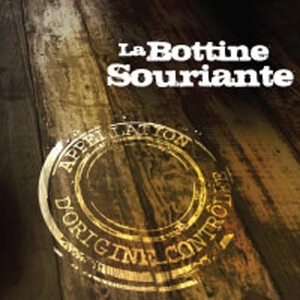 The French-Canadian supergroup La Bottine Souriante has a rollicking new disc by the classy-sounding title of Appellation d’Origine Contrôlée. If that title sounds familiar, you’ve probably seen it on the label of a bottle of French wine. Literally translated, it means “controlled designation of origin.” In English, we’d probably say something like “all others are counterfeit.”
The French-Canadian supergroup La Bottine Souriante has a rollicking new disc by the classy-sounding title of Appellation d’Origine Contrôlée. If that title sounds familiar, you’ve probably seen it on the label of a bottle of French wine. Literally translated, it means “controlled designation of origin.” In English, we’d probably say something like “all others are counterfeit.”
That’s not to say that La Bottine Souriante (which means “the smiling boot,” a reference to the appearance of an old worn-out work boot) is the only authentic Quebecois folk ensemble. But LBS is definitely the only group that makes music like this!
The current iteration of La Bottine contains 11 members. They include the usual suspects, players of fiddles (David Boulanger and Jean-François Gagnon-Branchaud), guitar (Éric Beaudry), accordions (Pierre Belisle and frontman Benoit Bourque) and bass (François Marion), with a couple of those players doubling on the music’s distinctive foot percussion. To this basic lineup they’ve added piano, electric piano and organ, trumpet, saxophone and a couple of trombones, and the world-class step-dancing of Sandy Silva. I saw this big band headline a dance at the Festival du Bois in Maillardville, a suburb of Vancouver, B.C., in 2009, and it was utterly fantastic. They kept a huge tentful of beer-drinking West Coast francophones dancing, shouting and singing along late into the evening.
On record, the music isn’t quite that powerful, but it’s still lots of fun. At times it sounds like Quebecois folk crossed with Chicago Transit Authority – the late-1960s, lean, hungry version of the jazz-rock fusion band that became Chicago, that staple of soft-rock radio.
From the first track, “Cette Bouteille-Là,” a song about the perils of drink paired with a reel called “Bouchonné,” the album pairs mostly upbeat folkdance tunes (reels for the most part) and Quebecois music’s call-and-response vocals with a driving beat and jazzy arrangements. This one starts with just the foot percussion, but quickly adds more elements one by one and two by two – guitar, fiddles, fretless electric bass, the horns, and Silva’s step-dancing. For me the big thrill is when the organ comes in with a big glissando.
The second track, Mon Pére, a contemporary song after the style of traditional French-Canadian vocal music, adds a number of non-traditional touches. The response vocals are in multi-part harmonies that feature jazz chords and a droning bass under-layer that, paired with some non-trad percussion, gives it an afro-celtic sound. “Reel à Roland” starts off very traditional also, but slowly adds additional elements, paraticularly piano and horns. A little later on, “Chus Chatouilleux” incorporates some R&B and Caribbean sounds, with electric guitar and some percussion that sounds like a marimba. And “André Alain en sol Majeur” with its funky electric piano, makes this reel sound like something out of the 1970s west coast jazz scene.
“Au Rang d’Aimer” is a lovely Louisiana Creole song whose title in English is “Starting to Love.” They play it fairly straight on this tune, with button accordion, mostly acoustic instruments and subtle use of the horn section. The vocals are particularly beautiful on this one. There’s also a Basque-inspired song (“Intsusadi”), an homage to the Calgary Stampede that sounds like something from the Louis Beaudrault songbook, and a traditional Quebecois tune paired with a Cape Breton reel (“The Smith’s Burn”).
This one is not for the purists, although most followers of French-Canadian music have known not to expect that from La Bottine since the 1980s. While it doesn’t quite match the live experience, it’s probably the next best thing. Lively, melodic, rhythmic and supremely inventive.
(Borealis, 2011)
